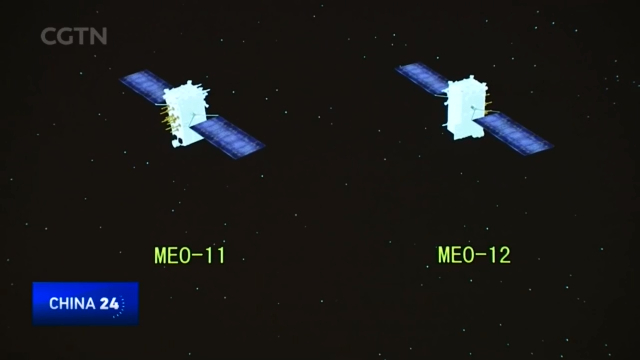
21:22, 25-Aug-2018
Blast Off: China launches another pair of BeiDou-3 navigation satellites
Updated
20:34, 28-Aug-2018
03:17

China has successfully sent a new pair of BeiDou navigation satellites into space on a single carrier rocket from the Xichang Satellite Launch Center in southwest China's Sichuan Province. The mission is crucial to the Beidou-3 network project, which is expected to be completed by 2020. CGTN's Yang Jinghao has more.
The latest launch mission from southwest China. A pair of BeiDou-3 navigation satellites blasted off on a Long March-3B carrier rocket at 7:52 am Beijing Time. The twin satellites entered the designated orbit following a journey of some four hours.
ZHANG XUEYU COMMANDER-IN-CHIEF OF THE PROJECT "I hereby declare that the launch mission was completely successful!"
YANG JINGHAO XICHANG "The pair are the 11th and 12th satellites of the BeiDou-3 network project, also the 35th and 36th orbiters for China's BeiDou Navigation Satellite System. More satellites are scheduled to be launched from here by the end of this year."
The satellites were carrying the laser inter-satellite link terminals, which was one of the highlights of this launch.
LI GUOTONG, COMMANDER-IN-CHIEF SHANGHAI ENGINEERING CENTER FOR MICROSATELLITES "The main function of this technology is to improve the accuracy of the orbit determination of satellites through more precise measurement among them. This is conducive to improving the positioning accuracy for users."
Different with previous generations, the BeiDou-3 satellites are much more lightweight and have achieved remarkable scientific breakthroughs in various aspects, such as the application of the hydrogen atomic clock.
SHEN XUEMIN DEPUTY CHIEF DESIGNER OF THE SATELLITES "Our satellites are equipped with a hydrogen atomic clock. It was independently developed by China and is a lot more accurate compared with the rubidium atomic clock that has been widely used by some other systems."
According to the plan, a basic system with 18 BeiDou-3 satellites will be in place by year's end. The system will then give service priority to the countries and regions along the Belt and Road.
RAN CHENGQI, DIRECTOR CHINA SATELLITE NAVIGATION OFFICE "We need to enhance cooperation and exchange with other navigation systems developed by the US, Russia and Europe to jointly advance the development of satellite navigation technologies. We also would like to share our technologies, products and talents with the countries participating in the One Belt, One Road Initiative, and other countries."
A complete 35-satellite network is due by 2020 when global users can enjoy the BeiDou's unique telecommunication service in the form of short messages. Technicians say more efforts are needed to enhance the performance of the satellites to be launched, including of their intelligence level for possible autonomous operations in space. Yang Jinghao, CGTN, Xichang, Sichuan Province.

SITEMAP
Copyright © 2018 CGTN. Beijing ICP prepared NO.16065310-3
Copyright © 2018 CGTN. Beijing ICP prepared NO.16065310-3